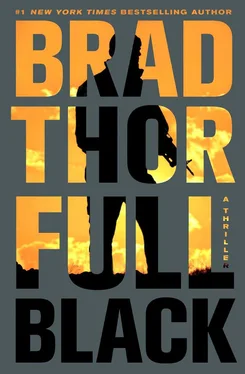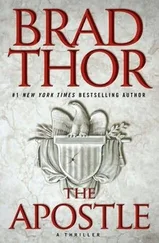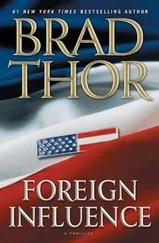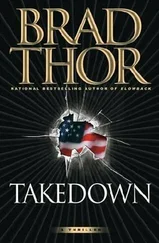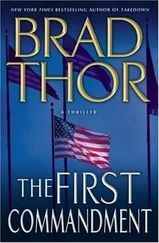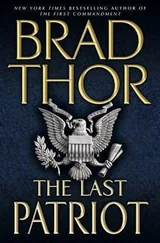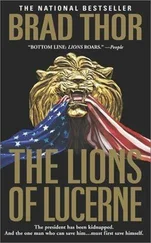Brad Thor - Full Black
Здесь есть возможность читать онлайн «Brad Thor - Full Black» весь текст электронной книги совершенно бесплатно (целиком полную версию без сокращений). В некоторых случаях можно слушать аудио, скачать через торрент в формате fb2 и присутствует краткое содержание. Жанр: Триллер, на английском языке. Описание произведения, (предисловие) а так же отзывы посетителей доступны на портале библиотеки ЛибКат.
- Название:Full Black
- Автор:
- Жанр:
- Год:неизвестен
- ISBN:нет данных
- Рейтинг книги:5 / 5. Голосов: 1
-
Избранное:Добавить в избранное
- Отзывы:
-
Ваша оценка:
- 100
- 1
- 2
- 3
- 4
- 5
Full Black: краткое содержание, описание и аннотация
Предлагаем к чтению аннотацию, описание, краткое содержание или предисловие (зависит от того, что написал сам автор книги «Full Black»). Если вы не нашли необходимую информацию о книге — напишите в комментариях, мы постараемся отыскать её.
Full Black — читать онлайн бесплатно полную книгу (весь текст) целиком
Ниже представлен текст книги, разбитый по страницам. Система сохранения места последней прочитанной страницы, позволяет с удобством читать онлайн бесплатно книгу «Full Black», без необходимости каждый раз заново искать на чём Вы остановились. Поставьте закладку, и сможете в любой момент перейти на страницу, на которой закончили чтение.
Интервал:
Закладка:
“The U.S. not-for-profit sector is the world’s seventh-largest economy. The foundations sit on over five hundred billion untaxed and largely unregulated dollars. Some of the biggest foundations give away more in a year than some nations’ GDPs. The power of a few of these foundations rival that of our own federal government, as well as the power of countries like Russia, France, and Great Britain. That was the crux of our film-how, where, and why that money and power is being spent.
“We were looking at the foundation world in general, but more specifically at a disturbing ideological agenda shared by many of them. We wanted to know how many of these large foundations, started by successful pro-business Americans, had turned so anti-business and in some cases downright anti-American. Why were environmental organizations lobbying Washington on issues that had nothing to do with the environment? Why were labor organizations lobbying on issues that had nothing to do with workers? Why were foundations funding pro-socialist and pro-communist textbooks and lessons in schools? Why were others supporting the eugenics movement and the works of Josef Mengele from Auschwitz, masquerading under the banner of human genetics? The list went on and on. The key in each instance was in following the money, and the more we followed it, the further down the rabbit hole we went.
“What we discovered was that beginning in the 1940s, radical elements inside the United States had recognized that there were these huge piles of money just sitting inside multiple large foundations and endowments all across the country. These big government collectivists, globalists, socialists, and communists realized that if they could get into positions of power, say on the boards of directors at the foundations or the endowments, they could steer the money any way they wanted. And that was exactly what they did.”
“So what you’re saying,” replied Ralston, “is that they used the money to buy influence.”
“Not only to buy influence,” the producer continued, “but to develop and push entire agendas. It was like having a tray of financial syringes. Any cause that met their radical agenda received huge injections of cash. Any causes that ran counter to their agenda received huge injections of poison and found themselves beset by opposition groups with bottomless wells of support. They used their money to cozy up to politicians, influence public policy, and elect their own candidates.”
“But how could they get away with that?” asked Ralston. “How would nobody raise a fuss or try to expose them?”
Salomon shook his head. “This isn’t just a mountain of hush money we’re talking about, it’s a whole range of mountains. This kind of power and influence can purchase a lot of silence.”
“And their boards just rubber-stamp anything they do?”
“They don’t need a rubber stamp,” replied the producer, “when the boards have all been stacked with members who see the world through exactly the same prism. If the people who had started many of these foundations were alive today, they’d be stunned to discover what was going on.”
Ralston didn’t doubt it, but so what? “The more you talk, Larry, the less I think this has anything to do with your documentary. I think we ought to be looking at other possibilities.”
“You’re wrong,” replied Salomon.
“Am I?” asked Ralston. “So lots of foundations and endowments have drifted from their original intent. Big deal. Your documentary might bring some unwanted attention to some in that industry, but as long as they’re not breaking any laws, I don’t see how anybody is really going to care.”
“That’s what I thought, too, until I saw what Chip and Jeremy had begun to dig up.”
“Which was what?”
“The foundations and the endowments need to make a return on their principal, so they invest in different vehicles. Often times, those vehicles are hedge funds. We discovered that a small group, the most radical, invested with one hedge fund in particular. It’s called the Standing Fund and is managed by James Standing.”
“The billionaire?”
“The vehemently anti-American billionaire,” Salomon clarified.
“So what?”
“So we discovered that there were some things even the most radical foundations and endowments were afraid to be tied to. What they weren’t afraid to do, though, was to use Standing as a cutout. Each of them agreed to allow Standing to retain part of their investment return in order to fund something they referred to as Project Green Ramp.”
“And what’s Project Green Ramp?”
Salomon looked Ralston directly in the eyes and stated, “An intricate plan to completely collapse the United States of America.”
CHAPTER 12
H arvath was on his way out of the farmhouse with a blanket and a bottle of water, when his cell phone rang. “Go ahead,” he said, answering the call and setting the items down.
“We’ve got a fix on the mobile phone Phoenix Three contacted from the accident site,” said Reed Carlton. Phoenix Three was the code name that had been given to Sean Chase for the operation. Harvath was Phoenix One and Riley Turner was Phoenix Two.
“We’ve got an address?” asked Harvath.
“That’s affirmative,” said the old man. “I’ll pass it off to you on the back channel.”
The back channel was a reference to the secure network the Carlton Group used to communicate and pass information to each other.
“Roger that,” said Harvath.
Using the code name they had created for Mansoor, based on his initials, the old man asked, “Any progress with Massachusetts?”
“Not yet,” replied Harvath, “but I think he’ll be warming up to us soon.”
“Good. I want this op wrapped up and everyone out of there as soon as possible. Understood?”
“Roger that,” replied Harvath. He and Carlton spoke at length about how long to give Phoenix Three before launching their takedown of the Uppsala cell. They both understood that the longer Chase was in their midst, the more he might be able to learn. They also understood that the longer he stayed, the greater the odds were that he might be discovered. If he was, they’d kill him on the spot.
The call ended, Harvath gathered up the blanket and the water bottle, and headed outside.
“Anything?” he asked as he approached the operative standing guard at the barn. “Praying? Crying? Anything?” Knowing how their prisoner had spent the time since Harvath had been gone would affect how he decided to continue the interrogation.
“Nothing,” replied the operative, an ex-CIA man named Andy Bachmann. He was in his late fifties and built like a drill instructor. The Old Man had suggested him for this operation as they’d known each other in the old days back at Langley, and Bachmann had worked in Sweden before. “Not a sound.”
Mansoor Aleem might be tougher than Harvath had thought. Nodding, he walked past Bachmann, unlocked the barn door, and jerked it wide. He stood there with the door open for several seconds to encourage the flow of cold air. The prisoner didn’t move.
Considering how he’d been shivering, there was no way that Mansoor could have fallen asleep. Had he slipped into unconsciousness? That would be a world record. He hadn’t been exposed to the cold that long.
For a moment, Harvath wondered if he was being played. “Time to wake up, Mansoor,” he said as he walked up to the man and snatched off his hood. There was no reaction.
The man’s head was bent forward, his chin resting on his chest. Harvath grabbed a fistful of hair and tilted his head back so he could look at his face. He slapped him, but the man didn’t even flinch. He wasn’t conscious.
Читать дальшеИнтервал:
Закладка:
Похожие книги на «Full Black»
Представляем Вашему вниманию похожие книги на «Full Black» списком для выбора. Мы отобрали схожую по названию и смыслу литературу в надежде предоставить читателям больше вариантов отыскать новые, интересные, ещё непрочитанные произведения.
Обсуждение, отзывы о книге «Full Black» и просто собственные мнения читателей. Оставьте ваши комментарии, напишите, что Вы думаете о произведении, его смысле или главных героях. Укажите что конкретно понравилось, а что нет, и почему Вы так считаете.
